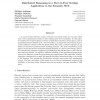Free Online Productivity Tools
i2Speak
i2Symbol
i2OCR
iTex2Img
iWeb2Print
iWeb2Shot
i2Type
iPdf2Split
iPdf2Merge
i2Bopomofo
i2Arabic
i2Style
i2Image
i2PDF
iLatex2Rtf
Sci2ools
JAIR
2006
2006
Distributed Reasoning in a Peer-to-Peer Setting: Application to the Semantic Web
In a peer-to-peer inference system, each peer can reason locally but can also solicit some of its acquaintances, which are peers sharing part of its vocabulary. In this paper, we consider peer-to-peer inference systems in which the local theory of each peer is a set of propositional clauses defined upon a local vocabulary. An important characteristic of peerto-peer inference systems is that the global theory (the union of all peer theories) is not known (as opposed to partition-based reasoning systems). The main contribution of this paper is to provide the first consequence finding algorithm in a peer-to-peer setting: DeCA. It is anytime and computes consequences gradually from the solicited peer to peers that are more and more distant. We exhibit a sufficient condition on the acquaintance graph of the peer-to-peer inference system for guaranteeing the completeness of this algorithm. Another important contribution is to apply this general distributed reasoning setting to the setting o...
Related Content
| Added | 13 Dec 2010 |
| Updated | 13 Dec 2010 |
| Type | Journal |
| Year | 2006 |
| Where | JAIR |
| Authors | Philippe Adjiman, Philippe Chatalic, François Goasdoué, Marie-Christine Rousset, Laurent Simon |
Comments (0)

